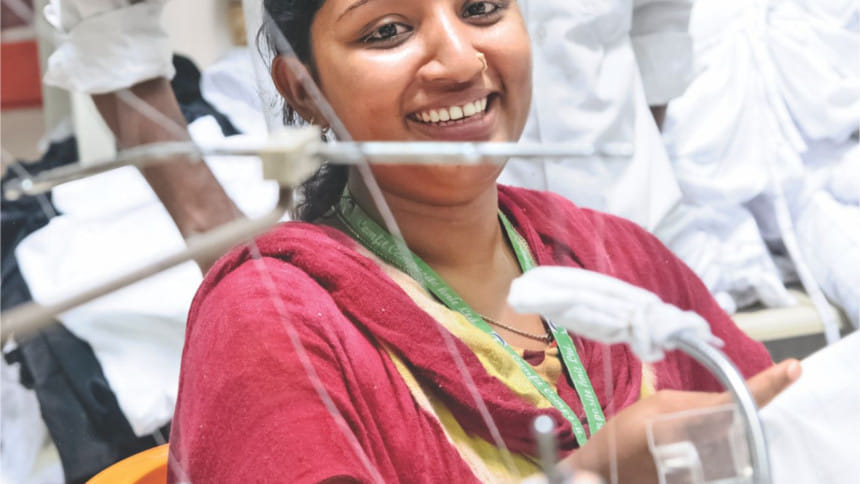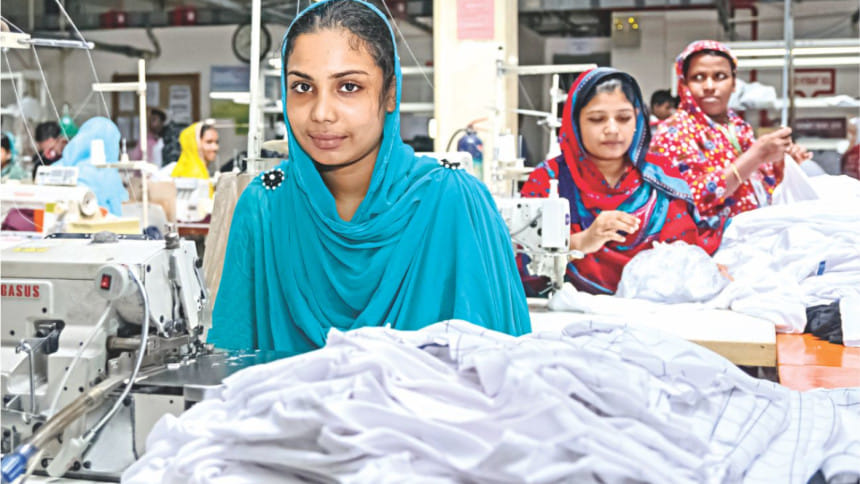Woes of Garments Workers: Introducing SRHR

Momina Khatun (not her real name) has been working in a garment factory in Savar for three years. She is a mother of a 4 year-old boy. Her husband also works in another garment factory and with both of their hard earned income; they take care of their small family and their parents residing in the rural areas of Bangladesh's Kushtia district.
When I was employed in the factory my son was only a year old. When I went to work I used to keep my boy with an elderly neighbour of mine and I had to pay her a good amount of money. However, I soon started to realise that I was unable to afford the expenditure and my toddler son was also not taken care of properly. My son was also too restive to be controlled by an old person,” says Momina.
As a result, Momina had to come up with a solution that was effective but not acceptable. “Now when I go to work I tie my son with a shackle to the door of their only room. The shackle is a few yards in length which allows him to move and feed but not to go outside the room,” shares Momina. When Momina heard that one of her colleague's son of the same age died from drowning in a pool when the mother was at work, this was the only solution anxious Momina could come up with.
The strict working schedule in these garment factories also added further hardships for these working mothers. Long working hours often do not allow them to maintain health precautions that are necessary for lactating mothers. “Our factory and residences are both in Savar, adjacent to the Dhaka-Aricha highway. If we or our children fall sick, we have to travel a long distance to get better treatment. And, quality treatment for the mothers of new born babies is really very scarce and quite expensive for us, shares Sharifa Akhter a colleague of Momina.

However, an initiative has been taken to establish the rights of these working mothers; the right to give proper care to themselves and to their beloved children. SNV Netherlands Development Organisation has come up with a unique model called Inclusive Business Model which includes clinics, garment factories and women workers to build their capacity to provide sexual and reproductive healthcare facilities to the workers. The healthcare professionals of clinics adjacent to garment factories are provided with funds and capacity building trainings so that they can offer sufficient services to these women. On the other hand, the garment factory management is consulted to work with the nearby clinics so that their workers can get proper healthcare facilities in due time and in affordable price.
A management of Northern Corporation Limited says, “We welcomed the development workers when they came to train our officials and workers about the sexual and reproductive health rights of female RMG workers. We have started working with a nearby clinic and hospital where our workers can get medical facilities at discounted price and they have also hired a female doctor to provide maternal and gynaecological services.”
At present, SNV has reached 20 garment factories and enabled them to provide sexual and reproductive healthcare facilities for 22,000 female workers. “This unique model builds the capacity of every stakeholder such as healthcare professionals, garment workers and factory managers to make it sustainable and effective. By providing quality services medical centres will be benefitted, by getting healthy manpower the production line of the industries will be increased and the workers will lead a healthy life and this sustainable developed future is our goal,” says Fartheeba Rahat Khan, team leader of Working with Women Project which has been implementing Inclusive Business Model in Bangladesh.
Four million female workers are working in more than four thousand garment factories in Bangladesh which is the lifeline of the country's economy. Many factories are still negligent about this basic right of their workers. The government should take step to encourage these initiatives and monitor the implementation so that the workers can truly be benefitted which will ultimately nourish the country's economy.

 For all latest news, follow The Daily Star's Google News channel.
For all latest news, follow The Daily Star's Google News channel. 



Comments